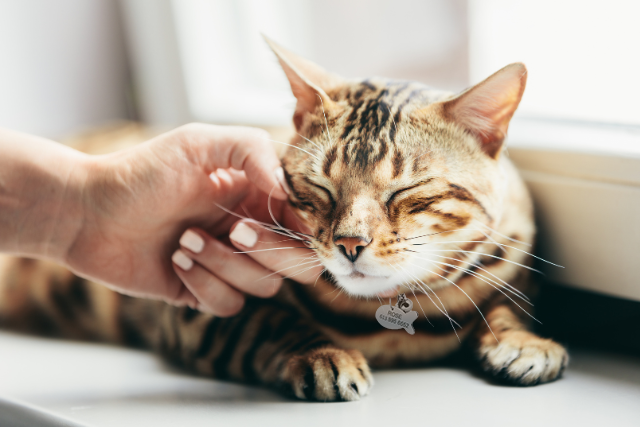Enrichment for Your Pet
Help your pet live their best, healthy, happy life and have fun while doing it? Welcome to pet enrichment!
Enrichment is an activity that helps meet your pet’s mental and physical needs by allowing them to express their natural behaviours. Giving your pet daily enrichment not only reduces their stress and enhances their lives, it brings you closer together! There are three types of enrichment your pet should experience every day:
Environmental Enrichment
Your pet’s environment plays a big role in their well-being. Set up your pet’s living area with things that help them express their natural behaviours.
Sensory Enrichment
It’s important to engage all of your pet’s senses; sight, smell, taste, touch and sound.
Social Enrichment
Pets love their people! Make sure you’re taking time each day to satisfy your pet’s need to get social.

Dog Enrichment
Dog Enrichment Guide
Instinctual behaviours
Different dog breeds often have instincts that are specific to their breed. These can include herding, tracking, guarding or retrieving. Research your dog’s breed and come up with activities that meet these instinctive drives, such as agility training, scent tracking games and fetch or retrieving games.

Food
Many dogs are motivated by food, and giving them food in new and interesting ways can exercise their mind while satisfying their hunger. Try lick mats, food dispensing puzzles, snuffle mats or food-stuffed Kongs. Rotate the items you use to keep it interesting and continue to challenge your dog.

Sensory Enrichment
Dogs have a really good sense of smell. Engage your dog’s smell by taking them on a “sniffari” walk, letting them slow down and sniff as much as they want. Play “hide and treat” by hiding treats or kibble and encouraging your dog to sniff them out, or create a “sensory garden” using different scents, sights and sounds for your dog to explore and interact with. Get creative!

Socialization and Training
Spending quality time with your dog will help them develop trust and a strong emotional bond with you. One great way to do this is through positive reinforcement training! Spend time each day teaching your dog a new trick or working on their canine etiquette – your dog and your community will thank you.

Cat Enrichment
Cat Enrichment Guide
Climbing
Cats are natural climbers! Make sure your cat has vertical space to jump and climb or just hang out – it makes them feel safe to be up high. Cat trees are perfect for this, or try adding cat shelves to your walls.

Scratching
Cats scratch to maintain healthy claws, stretch their legs and mark their territory. Scratching is an important part of letting a cat express their natural instincts. Provide your cat with a scratching post or board and train your cat to scratch it instead of the furniture. Make sure your cat has something accessible to scratch at all times.

Hunting
Hunting is an important part of a cat’s life. Meet your cat’s hunting needs by providing lots of toys and interactive playtime, like a cat wand or throwing a toy or ball for them to chase. Play these games before mealtime to simulate hunting for their food, or before bed to help release their energy. You can also feed your cat using puzzle toys or lick mats so they exercise their mind while eating.

Socialization and Training
Cats can be independent but many choose to spend quality time with their favourite people. Spending quality time with your cat could look like sitting in the same room as a shy cat or cuddling up on the couch. Did you know cats can also be trained? Trying using positive reinforcement training to teach your cat a new trick or train adventurous cats to walk on a leash and harness outside. Remember, you should never let your cat outside unsupervised.
Learn more about keeping your cat happy and healthy indoors.

Small Animal Enrichment
Small Animal Enrichment Guide
Digging and Foraging
Small animals are natural foragers, and love to dig. Satisfy this need by making a forage box. Start with a cardboard box, or a shallow tray for Guinea pigs, and fill it with crumpled or shredded paper, scrap fabric, hay, pellets and vegetables, and let them dig around and explore.

Chewing
Most small animals have teeth that continually grow, so they need to chew in order to maintain healthy teeth and satisfy their natural instincts. Give your pet a variety of chewing options and make sure they’re appropriate for their breed.

Problem solving
Small animals can be very smart, and require mental exercise to keep them happy and healthy. Try making food puzzle toys for your little friends that encourage them to move, sniff, shred and use their brain. Set up mazes and obstacle courses for your small animals to conquer, and use high-value treats to entice them.

Socialization
Many small animals are social creatures and love to spend time with their favourite people! Do your research on your pet’s breed to find out how you can best socialize with your pet. Many small animals like rats and Guinea pigs do best in pairs so consider getting them a friend to live with.



